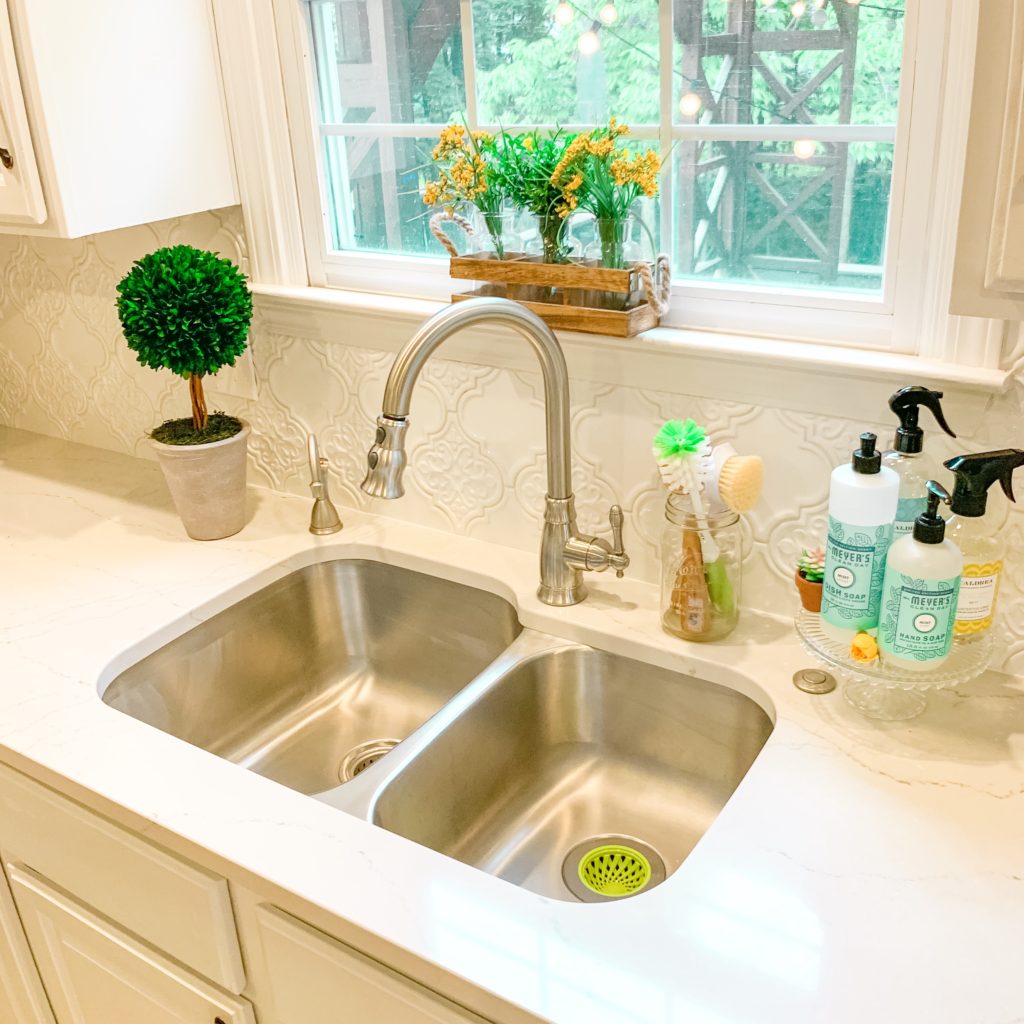Cleaning your kitchen sink is a necessary task to maintain a healthy and hygienic kitchen environment. It can be a daunting task, however, with many different products and methods available to clean your sink. Depending on the type of sink you have, the best method for cleaning it can vary. Some common cleaning materials include dish soap, baking soda, vinegar, and hydrogen peroxide. For tougher stains, you may need to use a scrub brush or even a commercial kitchen cleaner. Regardless of the cleaning method you choose, you should always rinse the sink with water afterward to ensure it is free of any residue.

Kitchen Sink Cleaning Basics
When it comes to keeping a kitchen sink clean and hygienic, it can be a challenge to know which products and methods to use. With that in mind, it’s important to have a good understanding of the basics of kitchen sink cleaning. Not only will this ensure that your sink is always clean and germ-free, but it can also prevent damage from occurring.
When cleaning your kitchen sink, start by removing all food debris and waste. Scrub the sink with a sponge or brush, using a mild dish soap and warm water. Rinse with clean water and dry with a clean cloth. For tougher kitchen messes, such as dried-on food, try using a baking soda and vinegar mixture. Simply mix a cup of baking soda with a half cup of vinegar and spread the paste over the affected area. Let the mixture sit for 20 minutes and then scrub it away with a sponge.
When it comes to everyday cleaning and deodorizing, white vinegar can be used as a natural cleaning agent. Simply fill the sink with a few inches of hot water and add 1/4 cup of white vinegar. Allow the mixture to sit for 15 minutes and then drain. If there is a strong odor, repeat the process.
By following these simple steps, you can make sure that your kitchen sink is always clean, hygienic, and free from odors. With a little bit of effort, you can keep your kitchen sink looking its best and ensure that it is properly maintained.
Types of Cleaning Products
When it comes to cleaning a kitchen sink, it’s important to use the right cleaning products. There are many types of cleaning products on the market, each designed for different types of use. For example, there are all-purpose cleaners such as baking soda and vinegar, which can be used to clean a variety of surfaces. For tougher stains, you may want to use a specialty product like a cream cleanser or a degreaser. For stainless steel sinks, you can use a stainless steel cleaner to help restore the shine. Finally, don’t forget to use a disinfecting product to kill germs and bacteria. With the right cleaning products, you can keep your kitchen sink sparkling clean.
Benefits of Natural Cleaning Products
When it comes to cleaning your kitchen sink, using natural cleaning products can be a great option. Natural cleaning products are a safer and more sustainable option that can help keep your kitchen sink clean without the use of harsh chemicals. Not only are natural cleaning products better for the environment, but they are also healthier for your family. Natural cleaning products are made from plant-based ingredients that are gentle on the skin, non-toxic, and free of harsh chemicals. They are also biodegradable, meaning that they are broken down easily, eliminating the need for harsh chemical disposal. Natural cleaning products are also more cost-efficient when compared to traditional chemical-based cleaning products, as they are often cheaper and can be used for multiple tasks. Additionally, natural cleaning products are often better for removing tough stains and residue, making them an ideal choice for cleaning your kitchen sink. With all the benefits of natural cleaning products, it is clear that they are the best option for keeping your kitchen sink clean and free of harsh chemicals.
Disadvantages of Chemical Cleaning Products
Using chemical cleaning products to clean your kitchen sink may seem like a convenient and quick way to get the job done, but some potential disadvantages should be considered. Chemical cleaning products are often very harsh and can be damaging to your sink and countertops. The harsh chemicals can cause corrosion and can even leave behind a residue that can be difficult to remove. The chemicals can also be hazardous to your health, causing skin irritation and even breathing problems. Additionally, the fumes from the cleaning products can be overwhelming and can be difficult to get rid of. In some cases, the chemicals can even seep into the water supply and contaminate the water. Therefore, it is important to consider the potential risks associated with using chemical cleaning products before using them in your kitchen.
Best Practices for Cleaning a Kitchen Sink
Maintaining a clean kitchen sink is essential for a hygienic and sanitary home. It’s important to keep it clean not only for aesthetic reasons but also to prevent the growth of bacteria. But with so many different cleaning products and methods available, it can be hard to know what to use to clean the kitchen sink. Here are the best practices for keeping your kitchen sink sparkling clean.
First, use a mixture of hot water and dish soap to remove dirt and grime. It’s important to use a soft cloth or sponge when wiping down the sink so as not to scratch the surface. When finished, rinse with hot water and dry with a clean cloth.
Second, use a mild household cleaner to disinfect the sink. Many natural cleaners such as white vinegar and baking soda are effective at killing germs and bacteria. Be sure to rinse well after cleaning with these products.
Third, use a stainless steel cleaner or polish on stainless steel sinks to keep them looking their best. These cleaners and polishes are specifically designed to protect and shine stainless steel surfaces.
Finally, use a lemon and salt scrub to remove tough stains. This method is especially effective on porcelain sinks. Simply mix equal parts lemon juice and salt, and scrub the stains with a sponge. Rinse with hot water and dry with a clean cloth.
By following these best practices, you can keep your kitchen sink sparkling clean and free of harmful bacteria. Don’t forget to rinse and dry your sink after each use to keep it looking its best.
Tips to Make Cleaning Easier
Maintaining a clean kitchen sink is essential for a healthy and hygienic kitchen. But, it can be a chore to keep it sparkling. To make it easier and more efficient to clean your kitchen sink, it is important to understand what products are best to use. Here are some tips and tricks to make your kitchen sink cleaning routine simple and effective.
First and foremost, it is best to use a product specifically designed for kitchen sinks. This will ensure that it is safe for your sink and won’t damage its finish. Natural and mild cleaners are the best option, as they won’t leave behind any harsh chemicals or residues.
It is also recommended to use a soft scrub brush or cloth and a non-abrasive cleaning sponge. This will help to remove any built-up grime, grease, and dirt without causing any damage. For tougher jobs, such as removing rust or hard water stains, an environmentally friendly cleaning solution can do the trick.
Finally, it is important to rinse the sink thoroughly after cleaning. This will ensure that any residue is washed away and your kitchen sink is left sparkling clean. With these simple tips and tricks, you can make sure that your kitchen sink is always clean and hygienic.
Common Mistakes When Cleaning a Kitchen Sink
Cleaning the kitchen sink can be a daunting task, especially if it’s been neglected for a while. However, tackling this chore is a necessary part of any kitchen maintenance routine. Unfortunately, there are a few common mistakes that people make when they are cleaning a kitchen sink. Some of the most common mistakes include using the wrong cleaning products, not disinfecting the sink, and not taking the necessary precautions when dealing with chemicals.
Using the wrong products can cause more damage than good, so it’s important to choose the right cleaning agents for the job. Harsh chemicals, such as bleach and ammonia, can damage the sink’s surface and cause discoloration. Instead, use mild dish soap and warm water to clean the sink. For tougher stains, use a commercial kitchen cleaner specifically designed for stainless steel surfaces.
Another mistake is not disinfecting the sink. Bacteria, dirt, and grime can accumulate in the sink, so it’s important to disinfect it with a disinfectant spray or wipes. Make sure to wipe down the entire sink to remove any bacteria and dirt. This will help to prevent the spread of germs and keep your kitchen safe for cooking and eating.
Finally, it’s important to take the necessary precautions when dealing with chemicals. Wear gloves, safety glasses, and a face mask when using any cleaning agents, and make sure to follow the directions on the product carefully. Keep the windows open for ventilation, and avoid mixing different chemicals as this can create toxic fumes.
Cleaning the kitchen sink can seem intimidating, but it doesn’t have to be. By avoiding the common mistakes outlined above, you can ensure that your sink is clean and disinfected in no time.
Cost Comparison of Different Cleaning Solutions
When it comes to keeping your kitchen sink clean, there are a variety of options available. From natural ingredients to store-bought cleaners, there are many ways to get the job done. But which one is the most cost-effective? In this article, we’ll compare the cost of different cleaning solutions and explore which one is the most budget-friendly.
For a natural cleaning solution, you can use a mixture of vinegar and baking soda. This combination is powerful enough to cut through grease and grime while being gentle on your sink and pipes. It’s also incredibly affordable, with vinegar and baking soda costing just a few dollars.
Alternatively, you can opt for commercial cleaning products. These can be more expensive than natural solutions, but they are often more effective. Store-bought cleaners will typically cost anywhere from $5 to $20, depending on the brand and type of cleaner.
The third option is to hire a professional cleaner. This is the most expensive option of the three, but it can be beneficial if your sink has built-up dirt and grime. Professional cleaners typically charge by the hour, so the cost can vary depending on the size and condition of your sink.
When it comes to cost comparison, natural cleaning solutions are the most budget-friendly option. Vinegar and baking soda are both inexpensive and effective, making them a great choice for those looking to save money. Commercial cleaners are slightly more expensive but offer stronger cleaning power, while professional cleaners can be costly but are ideal for tough jobs. Ultimately, the best cleaning solution for you will depend on your needs and budget.
Conclusion
There are many options for cleaning your kitchen sink. Depending on what type of material your sink is made out of, you may want to use a non-abrasive cleaner, a baking soda and vinegar solution, or a bleach and water solution. No matter which option you choose, it is important to keep your kitchen sink clean and sanitized to ensure the safety and health of your family.


